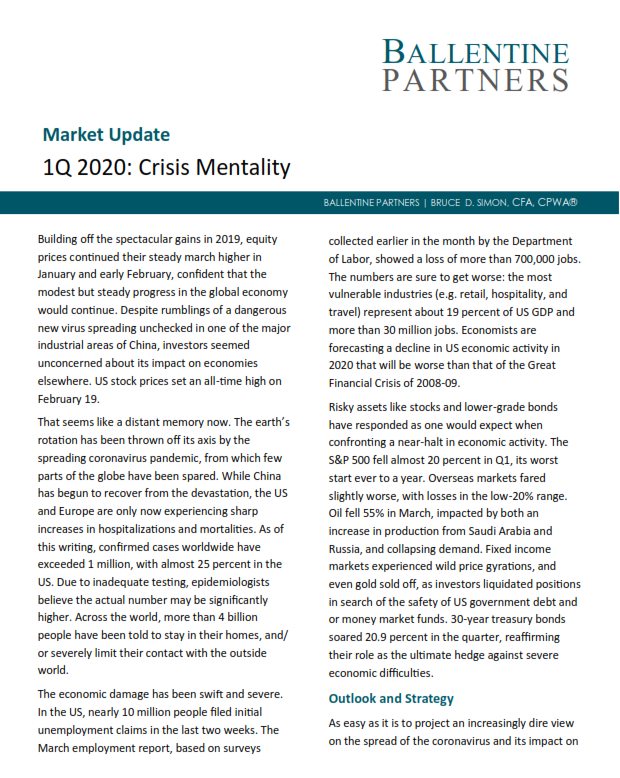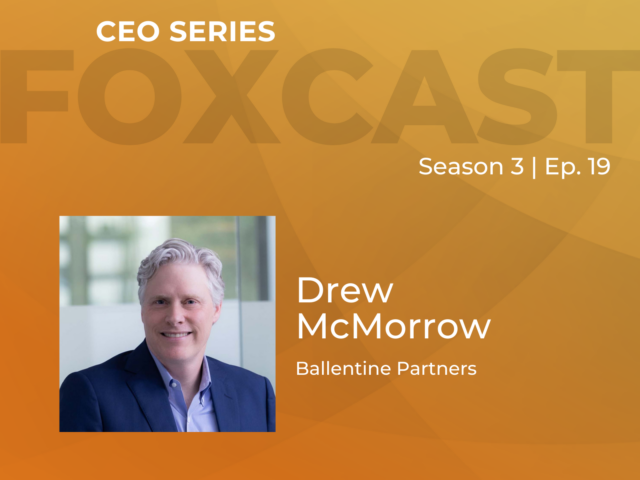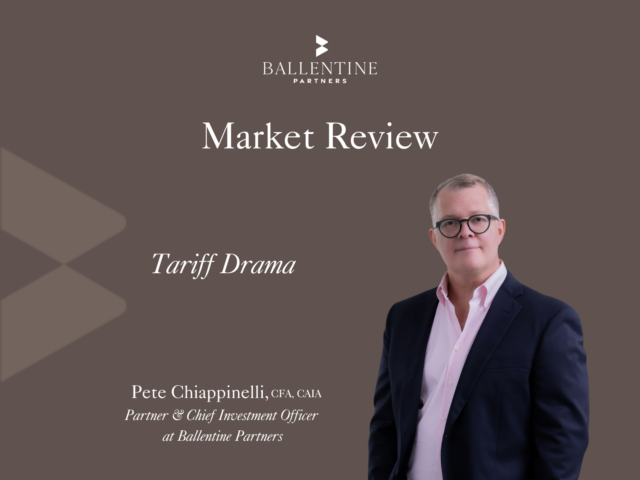Market Update
Building off the spectacular gains in 2019, equity prices continued their steady march higher in January and early February, confident that the modest but steady progress in the global economy would continue. Despite rumblings of a dangerous new virus spreading unchecked in one of the major industrial areas of China, investors seemed unconcerned about its impact on economies elsewhere. US stock prices set an all-time high on February 19.
That seems like a distant memory now. The earth’s rotation has been thrown off its axis by the spreading coronavirus pandemic, from which few parts of the globe have been spared. While China has begun to recover from the devastation, the US and Europe are only now experiencing sharp increases in hospitalizations and mortalities. As of this writing, confirmed cases worldwide have exceeded 1 million, with almost 25 percent in the US. Due to inadequate testing, epidemiologists believe the actual number may be significantly higher. Across the world, more than 4 billion people have been told to stay in their homes, and/or severely limit their contact with the outside world.
The economic damage has been swift and severe. In the US, nearly 10 million people filed initial unemployment claims in the last two weeks. The March employment report, based on surveys
collected earlier in the month by the Department of Labor, showed a loss of more than 700,000 jobs. The numbers are sure to get worse: the most vulnerable industries (e.g. retail, hospitality, and travel) represent about 19 percent of US GDP and more than 30 million jobs. Economists are forecasting a decline in US economic activity in 2020 that will be worse than that of the Great Financial Crisis of 2008-09.
Risky assets like stocks and lower-grade bonds have responded as one would expect when confronting a near-halt in economic activity. The S&P 500 fell almost 20 percent in Q1, its worst start ever to a year. Overseas markets fared slightly worse, with losses in the low-20% range. Oil fell 55% in March, impacted by both an increase in production from Saudi Arabia and Russia, and collapsing demand. Fixed income markets experienced wild price gyrations, and even gold sold off, as investors liquidated positions in search of the safety of US government debt and or money market funds. 30-year treasury bonds soared 20.9 percent in the quarter, reaffirming their role as the ultimate hedge against severe economic difficulties.
Outlook and Strategy
As easy as it is to project an increasingly dire view on the spread of the coronavirus and its impact on
world health and the global economy, it is important to stay focused on one important fact: this too shall pass. The world’s population has overcome many crises like this in the past, including prior pandemics, skyrocketing inflation, and the threat of nuclear war. After a period of healing, societies recover, economies regain their footing, and markets move to new highs.
It seems misplaced and a bit surreal to focus our attention on managing people’s finances when many around us are seriously ill, dying, or having severe economic struggles. Yet, the best way we know to positively contribute in this situation is to do the best job we can serving our clients and the many people who are impacted and benefited by their lives and work. Our investment philosophy revolves around providing a blanket of protection in client portfolios (through investment grade fixed income and cash) sufficient enough to weather most economic storms, as unpredictable as they may be. The thickness of this blanket is dependent upon a client’s cash demands on their portfolio, as well as a sense for how tolerant a client may be of inevitable declines in value due to these unpredictable events. Once the blanket is sized, we invest the remainder of the portfolio in assets that are likely to provide long-term capital appreciation and inflation protection, such as equities, real assets, and other diversifying strategies.
We cannot be certain when the virus will be controlled, when medical advances may limit the severity of COVID-19, or when a vaccine may be introduced that will eradicate the disease. We believe that equity markets are likely to struggle until one or more of these conditions has been realized. In the meantime, governments around the world, and particularly in the US, are unleashing unprecedented amounts of monetary and fiscal stimulus to keep the most vulnerable people and industries afloat until the economic engine can restart again.
Having endured three major market selloffs in the last twenty years, our experience tells us that reacting to economic calamities by selling equities is, in hindsight, almost always a mistake. Rather, we view these infrequent episodes as opportunities to add to portfolio risk at significant discounts to pre-crisis levels. We make no claim as to when the stock market will bottom or at what level, but we have high confidence that patient investors will be rewarded over the long term by leaning in, rather than leaning away, from the current market turmoil.
Stay safe!
About Bruce D. Simon, CFA, CPWA®
Bruce is a Partner and the Director of Research at the firm. In addition to working directly with a number of family clients, Bruce serves on Ballentine’s Investment Management Committee, which is responsible for the oversight of all of the investment activities for the firm.
This report is the confidential work product of Ballentine Partners. Unauthorized distribution of this material is strictly prohibited. The information in this report is deemed to be reliable but has not been independently verified. Some of the conclusions in this report are intended to be generalizations. The specific circumstances of an individual’s situation may require advice that is different from that reflected in this report. Furthermore, the advice reflected in this report is based on our opinion, and our opinion may change as new information becomes available. Nothing in this presentation should be construed as an offer to sell or a solicitation of an offer to buy any securities. You should read the prospectus or offering memo before making any investment. You are solely responsible for any decision to invest in a private offering. The investment recommendations contained in this document may not prove to be profitable, and the actual performance of any investment may not be as favorable as the expectations that are expressed in this document. There is no guarantee that the past performance of any investment will continue in the future.




